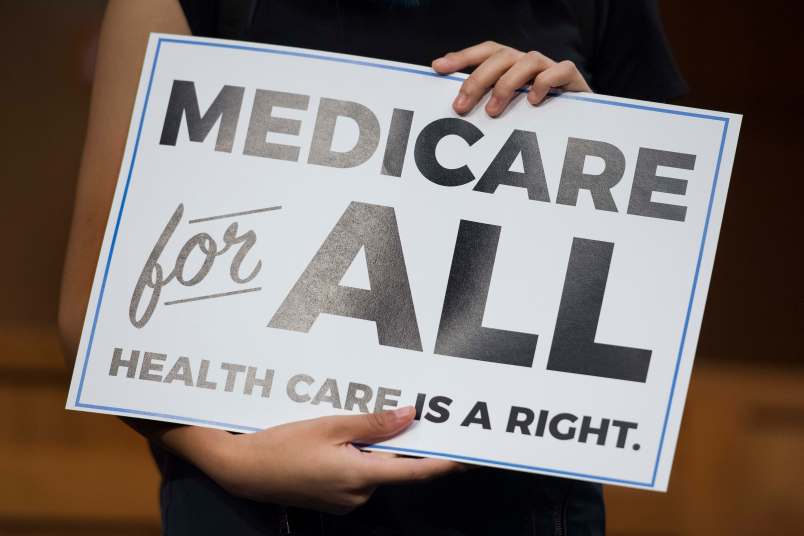One of the most important lessons, I would suggest one of the most ingrained lessons of the passage and subsequent defense of the Affordable Care Act (aka Obamacare) is that Democrats gained nothing for their efforts to accommodate Republican insistence on market-oriented solutions to expanding health care coverage. The ACA was, famously, based on the plan then-Gov. Mitt Romney (R-MA) passed in Massachusetts in the early aughts. The concept originated as a Heritage Foundation proposal meant to provide a ‘market-oriented’ alternative to Democratic universal coverage plans. Even worse than Republicans’ maximum resistance, many of the shortcomings of Obamacare were based on the plan’s concessions to the private insurance model of coverage.
For all these reasons, the experience has triggered a critical shift among Democrats. Single payer plans have always had substantial support among Democrats. For decades it was actually official party policy. But there was a middle group who supported single payer in principle but found either the politics intractable or the process of transition too complicated and disruptive given how entrenched the private system is and how interwoven it is with employment. Probably the majority of elected Democrats have been in this middle group for the last couple decades.
Democratic support in principle for single payer was easy to understand. Some variant of a national health care plan ensuring universal coverage exists in every country in Europe and Canada and it’s basically impossible to find anyone in those countries who wants to switch to our system. The Obamacare experience (and by this I mean largely the politics of it) has led many in that skittish middle group to decide or at least be open to the idea that half measures and incrementalism are a fools’ errand and that we need to bite the bullet, with all the complicated politics and complexities of transition and just implement a system that clearly works better in really every other wealthy industrialized democracy.
But there’s a problem.
Much of the debate is being carried on on the basis of polling and claims about public opinion that are highly misleading and in some cases intentionally so.
The point is simple. When you poll “Medicare for All” or “a national universal coverage plan” you get anywhere from clear to overwhelming majorities of public support – numbers ranging sometimes into the 60s or even 70s percentages. But when you add a range of the most obvious counters or negatives of such a plan, support drops dramatically.
For instance, if you ask about support for Medicare for All if respondents heard it would “eliminate health insurance premiums and reduce out-of-pocket health care costs for most Americans” you get 67% support and 30% opposition. But if you say it would “eliminate private health insurance companies” support drops to 37%. If you say that it would “require most Americans to pay more in taxes” that also pulls support down to 37%. (These numbers are all from this poll from the Kaiser Family Foundation from last month.)
Now there are good and clear rejoinders to both these criticisms, especially the second. Yes, it would lead to higher taxes. But certainly for the average American those new taxes would be less than the amount of money they currently pay in health insurance premiums. But this gets to a bigger point about politics. You never get to manage a political fight by defining the question entirely on your own terms or un-rebutted. Your opponents get to do the same. Some of those counter arguments will just be baseless or false and they need to be countered as such. With Medicare for All you will almost certainly hear Republicans talking about rationing, death panels, socialism and the like. Medicare for All would probably still include private health insurance providers offering supplementary plans as they currently do with Medicare for seniors. Some version of that exists in most countries with a national health care system. But it would almost certainly eliminate, either in practice or in law, health care plans as we currently know them, plans that provide a single source of reimbursement or coverage for all medical care.
That’s real. Most people hate their health insurers or find constant reasons for complaint with them. But as you can see from those numbers, eliminating private insurers and eliminating the plan most people currently have drives those support numbers down dramatically. Single payer advocates can say a Medicare style plan would be better than what you currently have. And they have the ubiquitous example of Medicare, which basically everyone can’t wait to get on, as a great proof point that that is the case. But people fear change, especially if they’re largely satisfied with what they currently have or fear they’d lose advantages in a new system.
The tax argument is vulnerable to similar counter-arguments. The argument that the country can’t afford Medicare for All because it would add tens of trillions in spending is a silly and fairly dishonest argument. It’s not new money. We’re already spending all that money. We’re just spending it as premiums through private insurers. Medicare for All would simply take the same money being paid as premiums and reroute it as taxes into Medicare. In fact, we’d likely save money, at least on a per capita basis since you remove the profit margin and get lots of efficiencies that Medicare currently enjoys. So in any fiscal sense, it’s a wash. In practice though it is a lot of new taxes. And that is a big cudgel opponents can and will use against any plan. As those numbers show, that too dramatically drives down support.
There’s another issue. Economists rightly count employer spending on health care premiums as de facto income to the employee. In practice though the taxes will likely fall on the individual, not the employer. It’s not so clear that every employer will immediately pass on savings on premiums to employees as salary. In fact, it’s almost certain many, probably most, will not – at least not at first. So for many people it could end up being a dramatic new expense in the form of taxes which they at least weren’t directly paying in premiums before. Over time that likely all shakes out. Maybe. But politics doesn’t play out over time. It plays out in the moment.
My point here isn’t to throw cold water on the whole effort or demoralize people who see Medicare for All moving to the center of the national debate. But it is a mistake to pretend it’s wildly popular or will be wildly popular in an actual political or legislative debate. Because that’s deeply misleading. It also leads to other confusions. Are Democratic leaders resisting the push for Medicare for All because they’re neo-liberal shills or corrupt weaklings? Or is it because they realize it’s much more political challenging than supporters claim. It may be a bit of each. But people are substantially understating the latter possibility.
There is also an argument that Democrats need to stop pushing for half-measures and actually frame the debate around an ideal or pragmatically ideal outcome. I agree with that. I have made this argument myself, specifically with regards to health care policy. That’s the big lesson for me from the Obamacare saga. Democrats sustained immense electoral damage for championing a system that allowed insurance companies to continue to operate and even get big federal subsidies. And they still worked to undermine the system and sabotage it both in policy and political terms. I myself am of the generation which was surprised at just how quickly the public moved on marriage equality. People with long political experience are subject to failures of political imagination. None of this means that these challenges can’t be overcome. Perhaps it will all happen as it did with marriage equality. But I doubt it. And tax policy may provide a handy illustration.
Tax policy provides an interesting counter-argument. Alexandria Ocasio-Cortez and Elizabeth Warren have rapidly changed the public debate about tax policy by proposing a 70% top marginal rate on income over $10 million and a wealth tax. Especially in the former case this is an almost textbook example of moving the ‘overton window’, shifting what is counted as possible within the public debate. To many pundits’ and politicos’ surprise, both proposals are actually pretty popular. It’s a good example of a proposal that simply wasn’t being made in the public square, in part because of false assumptions. Those proposals will probably still be hard to legislate. But legislating is always hard. And critically, there’s really no strong counters that have traction, as there are with major changes to the health care system. Do you support a 70% top marginal rates on income over $10 million? Well, what if you learned that some super rich people couldn’t buy a third boat? It doesn’t really work does it?
Now, there are counters. Republicans will say, it starts with high rates on the super rich but soon it’s a high rate for you in the middle class. That plays, sometimes effectively, on general mistrust of government in general. They’ll also argue that taking a big majority of income on dollars at any level is simply wrong. These arguments will have some impact. But not a lot. The idea of being worth more than $10 million is far, far outside the experience of the vast majority of Americans. The idea that you might make more than that much money in a single year is almost beyond comprehension. For a few decades Democrats have been arguing about minor quibbles in the high 30s or very low 40s percentage for the top tax rate. At a minimum it’s a good thing to put high rates on the table for extremely high income.
I’ll add the same disclaimer yet again. This isn’t an argument against Medicare for All or single payer. I’m a supporter. But no one ever helps themselves by underestimating the challenge of a fight on the way in. It’s a big challenge. There will be a lot of resistance, even from a lot of people who are supportive of the concept in broad terms. Grappling with that means coming up with counters to those obvious challenges, which makes the chances of success greater and the risk of electoral debacles lower.
[editor’s note: The original version of this post stated that all European countries have some version of single payer. That was sloppy and incorrect. They each have some version of a national health care system which ensures universal coverage. The plans range from centralized health care systems run by the government (the UK) to single payer to plans (Canada) to various public/private hybrid systems.]







